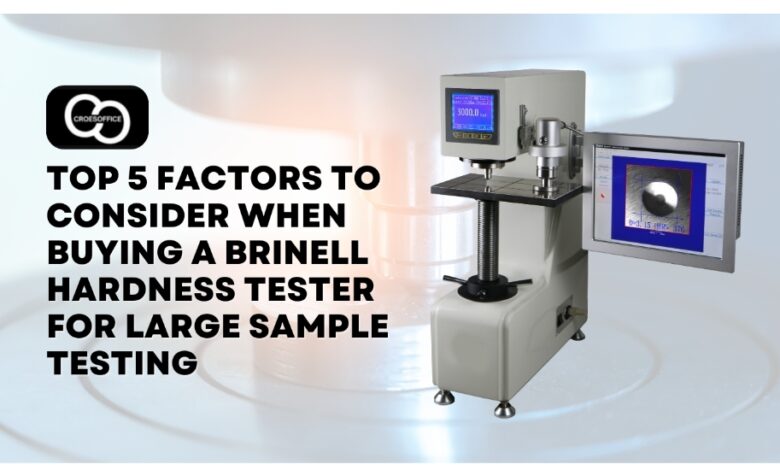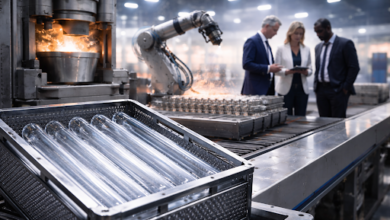Top 5 Factors to Consider When Buying a Brinell Hardness Tester for Large Sample Testing

Choosing the right Brinell hardness tester for large sample testing is important for delivering accurate results. Whether you’re testing heavy metals, alloys, or other large materials, you want a machine that can handle the job. But what factors should you prioritize before making a purchase?
Here are the top five considerations to help you select the perfect Brinell hardness tester machine for your lab or industrial environment.
1. Sample Size and Load Capacity
One of the first things to consider is the size and weight of the samples you’ll be testing. Brinell testers are designed to handle large materials, but not all machines are equipped for extra-heavy samples. Some testers are built for smaller, more delicate pieces, while others can manage larger, denser objects.
For testing large samples, you’ll want a machine with a high load capacity. Traditional Brinell hardness testers apply loads ranging from 500 kgf to 3000 kgf. King Brinell hardness testers, for instance, are known for their ability to handle heavy-duty testing.
Consider the types of materials and the size of your samples when choosing a machine. You’ll want something that can withstand the load without compromising accuracy.
2. Type of Brinell Hardness Tester
There are several types of Brinell-hardness testers, including manual, digital, and automatic. Each offers unique advantages depending on your testing needs.
Manual Brinell testers are straightforward but require more effort to operate.
Digital Brinell hardness testers offer more accuracy and ease of use, providing automatic measurements for faster results.
Automatic Brinell hardness testers are ideal for high-volume testing, offering efficiency without sacrificing precision.
If your lab handles a high volume of large samples, a digital or automatic tester might save you time and improve efficiency. For smaller operations, a handheld Brinell hardness tester or portable Brinell hardness tester can also be useful for on-the-go testing.
3. Accuracy and Precision
When it comes to Brinell testing, accuracy is everything. Inconsistent or inaccurate measurements can lead to faulty data, which is the last thing you want. The precision of the test depends on the machine’s calibration and the load it applies to the material.
Digital testers often provide greater accuracy because they calculate results automatically. They reduce human error, which is common in manual testing. Some automatic Brinell hardness testers even come with built-in software to ensure exact measurements.
Look for testers that offer excellent repeatability and high precision. Machines with digital displays or software integration can provide consistent and reliable readings, even for larger samples.
4. Durability and Maintenance
Testing large samples can be demanding on your equipment. The Brinell hardness tester machine you choose should be robust enough to handle constant use, especially in industrial environments.
When purchasing, check the durability of the tester. A King Brinell hardness tester, for example, is known for its heavy-duty design, capable of withstanding long-term use in tough conditions. You’ll also want a machine that requires minimal maintenance but is easy to calibrate when needed.
Also, consider the availability of replacement parts and technical support. A reliable tester is an investment, so it’s worth choosing one from a trusted manufacturer with strong after-sales service.
5. Portability and Flexibility
Sometimes, you need to test large samples in the field or on-site. If that’s the case, a handheld Brinell hardness tester or portable Brinell hardness tester may be your best option. These testers provide flexibility, allowing you to bring your testing capabilities to various locations without transporting heavy samples back to the lab.
However, portable testers are not always ideal for every situation. They may not offer the same load capacity or precision as a full-size Brinell tester. For high-accuracy testing in the lab, a digital Brinell hardness tester with a higher load range might be a better fit.
On the other hand, if your testing often requires mobility, a handheld Brinell hardness tester could be the right choice for your workflow. Determine whether portability or stationary accuracy is more important for your testing requirements before making a decision.
Why Large Sample Testing Requires Specialized Equipment
Large sample testing involves materials that standard testing machines may struggle with. When working with large samples, it’s important to use equipment specifically designed for the task. A Brinell hardness tester offers the capability to test bulky, heavy materials, which are often used in manufacturing or construction industries.
The hardness test provides critical information on a material’s resistance to deformation, which is key in applications like metal casting or heavy-duty engineering. Whether you’re using an automatic Brinell hardness tester for production or a portable Brinell hardness tester for on-site inspections, these machines help ensure materials meet quality standards.
Additional Considerations When Purchasing a Brinell Hardness Tester
Beyond the top five factors, there are a few additional elements to keep in mind. Some Brinell testers offer integration with software for data storage, reporting, and analysis. If your lab prioritizes efficient data management, consider testers with these features.
Also, be sure to assess the price of the machine relative to your budget. High-end models often come with advanced features but may be costly. Balance your budget with the machine’s capabilities to ensure it meets your needs without overspending.
Conclusion: Choosing the Right Brinell Hardness Tester for Your Lab
Selecting the right Brinell hardness tester for large sample testing can significantly impact your lab’s efficiency and accuracy. Whether you’re testing metals, alloys, or large industrial parts, considering factors like load capacity, accuracy, durability, and portability is key.
If you’re ready to explore the best options for your testing needs, explore the extensive range of Brinell hardness testers at Qualitest North America. You’ll also find all hardness tester equipment that is reliable, high-quality products designed for optimal performance.



